What Problems Do Podcasters Struggle With? Data & Results
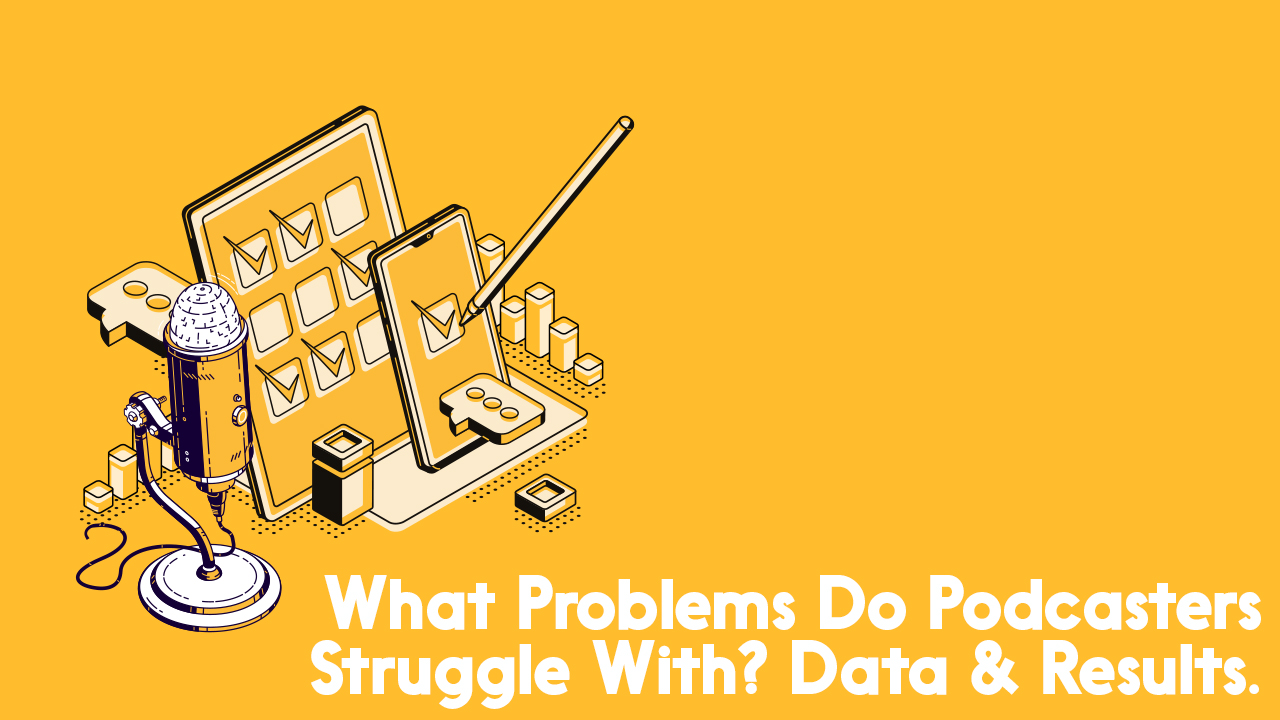
We want to make sure we’re providing the most relevant solutions and strategies for your podcast problems. And, podcasting technology and tastes can change quickly. So, a few months ago, we asked you to participate in a survey. In this article, I’d like to show you how the survey respondents answered, what insights they provided, and our resources for those podcast problems.
Over 260 of you answered the call, and boy howdy, did you provide a lot of helpful information. The open-ended answers were particularly interesting. I did my best to analyze and synthesize them all into meaningful patterns. So, without further ado, here are the results of our Podcast Problems Survey.
Methodology
Firstly, a little about the methods we used for this survey.
We set up a survey on our own site, using Typeform. This asked every one of the questions below and allowed respondents to fill in their thoughts.
We worked to promote this as widely as we could, primarily by inviting responses through our email list, banners on our site here, and on our social media. We also asked friends and partners in the industry to help promote it through their own channels, and many were kind enough to do so.
We received 266 responses, in total, after this promotion. This felt, to us, enough to draw some decent conclusions.
In terms of limitations, I acknowledge that these are mainly responses from people who follow our content and who are part of our audience. This was mitigated in part by asking as many others to help us promote the survey as possible, but there’s no doubt still a bias towards our own audience. This could influence the results.
Our audience has grown throughout years of being found on Google, and via the podcast, so it has come from a relatively broad base. Anecdotally, we’ve always received questions through the entire gamut of podcasting, from launch to full monetisation, so I feel we have a diverse range of experience in our audience.
Our web analytics demographics show a reasonable spread across age, gender and country of origin. Our content category stats show a bias towards beginners content, but later-stage content like growth, monetisation, presentation skills and the like still get a lot of attention. There are, after all, a lot more beginner podcasters than those who have stuck with it for a few years!
In future surveys, I think we could do better at reaching other communities, groups and types of podcasters to make sure we’re representing the entire industry, here. I’ll commit to working with even partners to make sure we gather those opinions – watch this space for the next edition and an updated methodology!
When You’re Making A Podcast, Where Do You Get Stuck?
The answers to this multiple choice question leaned heavily toward Promotion, at 47%. Ideas, scripting, and/or planning came in next at 17.9%. Editing had 13.4% of the responses, Scheduling had 9.2%, and Recording had 8.4%. Finally, Uploading & Publishing came in at 3.4%.
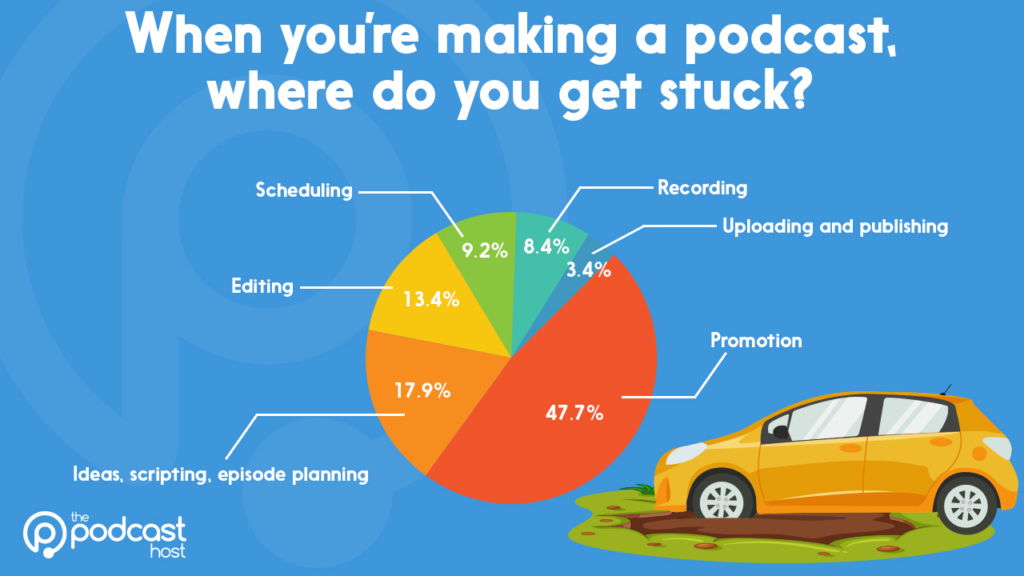
Personally, I was surprised that “Ideas, scripting, and/or planning” was the second most popular choice. Podcasters are a creative bunch. But, here are some of the resources that we’ve created over the years to address these particular concerns.
- Podcast Promotion: How to Promote a Podcast & Build An Audience
- The Art of Creating an Invisible Podcast Episode Script
- How to Make a Podcast With Alitu – The Podcast Maker App
- Podcast Editing: How & Where to Edit Your Podcast
- Podcast Interviews: Everything You Need to Know
How much does funding affect your ability to make your podcast?
When we analyzed the responses, I realized that one option was poorly worded. I was thinking about to what extent money governs your content. What I wanted to know is how much people need or want to read about monetization strategy. “I save up a chunk of money and don’t expect ever to get that back” could be interpreted to mean either, “I’m not interested in monetization strategies,” or “I have despaired of ever recouping any of the money I have put into this project.”
For example: when I made Jarnsaxa Rising, my goal was to “build skills, network, and get a better job.” In that case, podcasting was a financial investment in future employment. When you’re buying a good suit for job interviews, you don’t think about putting logos all over it like a NASCAR driver.
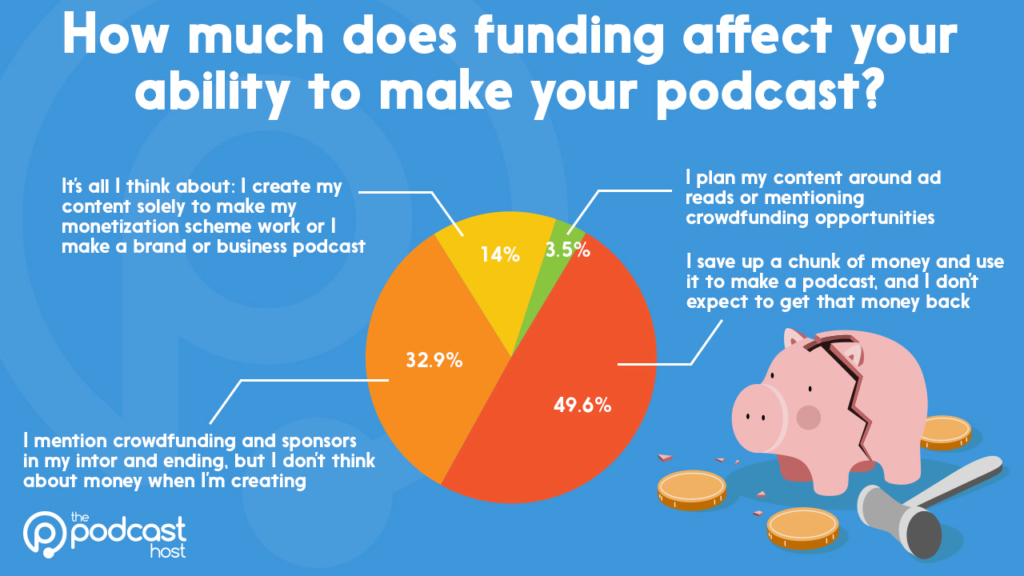
Now that I know a lot more about podcasting, I know how important being able to recoup some of that investment is. Based on the open-ended answers, it’s clear that monetization is significant to many of you. So, here are our guides to making money with your podcast.
- How to Monetize a Podcast | 12 Tried & Tested Monetization Methods
- Podbean Ads Marketplace Review: Businesses Can Benefit, No Matter Their Budget
- How RedCircle Is Helping Podcasters Monetize Their Content
- What’s the Best Patreon Alternative for Podcasters? Crowdfunding Choices
Do you read reviews of audio equipment?
Nobody enjoys buyer’s remorse. We don’t want you to sink a ton of cash into gear you don’t need. That’s why we create our gear reviews. We also know that there are only so many ways to describe a microphone. However, audio equipment designers and manufacturers find new ways to make recording gear efficient and affordable. So, what do we do? We asked how important gear reviews are to you.
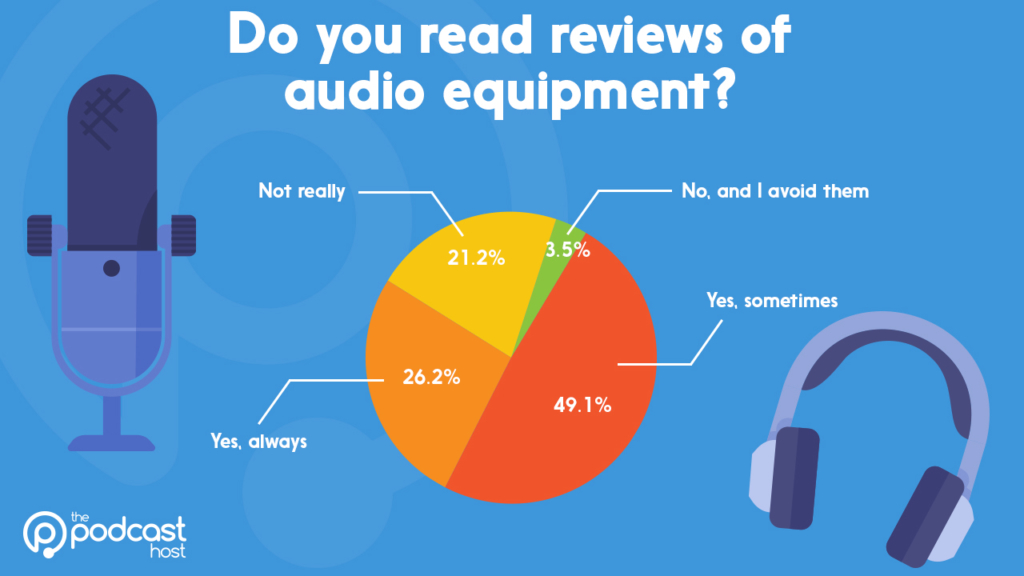
Over half of you said yes, you read product reviews. So, here are some of our more useful guides to audio equipment.
- Best Podcast Equipment for Beginners & Pros Alike
- The Best Podcast Microphones to Sound your Best: For Every Budget & Level
- The Best Digital Voice Recorders for Quality, Bombproof Audio Recording
- Best Headphones for Listening to Podcasts
When you need helpful information about making a podcast, do you prefer…
We have hundreds of articles on nearly every aspect of podcasting. As podcasters, we’re well aware that some people prefer to learn by listening to audio or watching a video rather than reading. Just how important is this distinction?

Pretty darn important, from the looks of things. 58% of respondents said they prefer a video with captions, and 32.6% preferred reading. So, we will offer more video content in the future. In the meantime, did you know that:
- Podcraft Academy has videos and downloadable resources to help you with any aspect of making a podcast.
- Our 7-Day Bootcamp walks you through the basics of creating and launching a podcast.
Also, we know that people do other things to solve their podcast problems besides reading, watching, or listening. That’s why we ask open-ended questions.
When you’re working on your podcast and you get stuck, what do you do to get help?
The majority of respondents said they searched on the internet to solve a specific problem. After that, many people said that they ask a friend, co-host, or a podcast network for help, especially people who have experienced the same problem.
Experience counts a lot. It’s the difference between a personal, tested solution and a standard, one-size-fits-nobody approach.
We know how important community is when it comes to making a podcast. That’s why we’ve started PodCraft.
This community is free to join and participate in. We have live discussions about different podcasting topics, conversations, an interview guest exchange, and more. All you have to have is a willingness to learn and be supportive.

What do you like the most about podcasting?
Overwhelmingly, respondents mentioned “freedom, self-expression, or creativity” as what they enjoyed most about podcasting. After that, it was “fostering connection, feedback, audience interaction, and helping others.” Many people said that they enjoyed their interview guests, collaborators, or other podcasters the most, or the act of interviewing itself.
In general, involvement with audiences, collaborators, or guests was important enough to push us toward launching the PodCraft community.
Some people mentioned that they enjoyed experimenting with audio, the variety of options available, and editing and sound design the most. Others said they enjoyed marketing, monetization, and expanding their brand. A few participants said they enjoyed the specificity and uniqueness of a podcast niche.
One respondent warmed my heart by saying, “It helped me get my light back.”
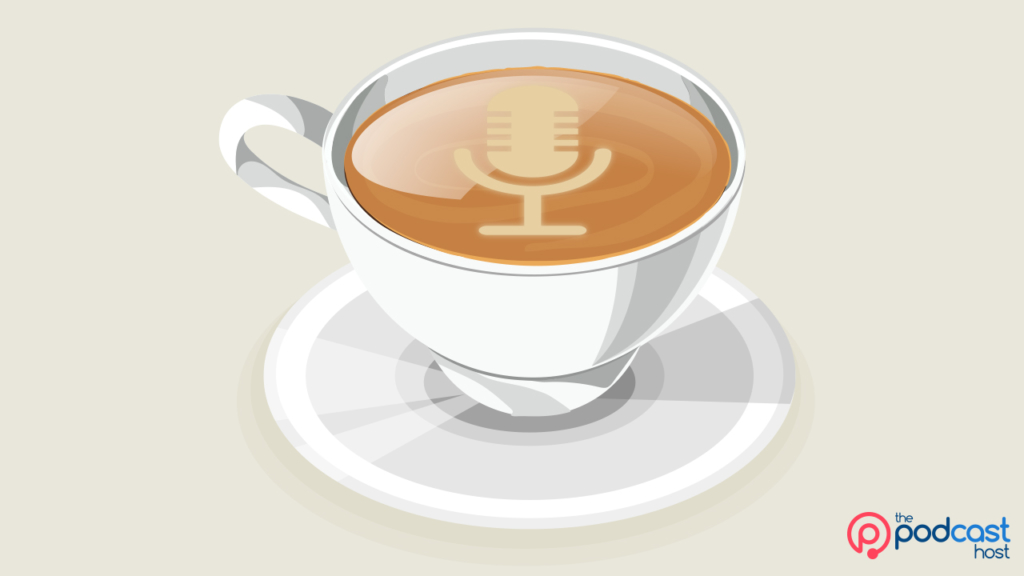
What’s your biggest area of frustration?
Here we have the most difficult part to summarize. The answers that folks provided were often specific to the individual’s experience. However, patterns stuck out. I’ll do my best to sum them up into some constellations of podcast problems.
Time, Work-Life Balance, and Confidence
Time management, work-life balance, and the teeter-totter between focus and procrastination made up the biggest sentiment mentioned. Confidence and focus play into this, too. If you have time, a lack of focus can ruin that time. If you have confidence but work 60 hours a week, it’s hard to carve out a couple of hours to plan, record or edit.
Podcasting comes with its own set of distractions that can throw you off. Social media, competition, and celebrity podcasts can make you not use your time effectively.
Here are some of our resources, not only for time management but also for using that time to best advantage.
- How Do I Find Time To Podcast?
- Podcast Production Tips For the Time Strapped Indie Podcaster
- Do Podcasters Need Social Media?
- Podcasting With Impostor Syndrome? 7 Common Self Critiques
Promotion, Discovery and Competition
Another amalgam of podcast problems is the relationship between market saturation, competition, and discoverability (“I put my work out there, but nobody can find it”) balanced with promotion and marketing (“I have trouble putting my work out there”). A frequently cited aspect of this podcast problem cluster was “social media.”
Let’s pause for a couple of statistics. According to Colin’s latest update of his Podcast Statistics & Industry Trends article for 2021:
- Apple Podcasts hosts 2,395,995 podcasts, as of December 2021.
- There are currently 548,447 active podcasts on Apple Podcasts.
That’s solely Apple, not the entire podcast universe. It’s still a good sample. My basic, back-of-an-envelope math tells me that less than 23% of podcasts (on Apple) are active. If you’re releasing episodes regularly, you already have an advantage over more than 77% of the podcasts in the podcastverse. If you’re not actively releasing episodes, there isn’t as much competition as there seems.
There’s a lot to be said for having a dedicated full-time PR department. But, you can do the same tasks as the pros, Here are some resources that should help:
- Where to Advertise Your Podcast | The Guide to Podcast Advertising
- How To Make a Podcast Media Kit (& Why You Might Want One)
- Your Perfect Podcast Logo: Crafting Cover Art to Grab Attention
- A Beginner’s Guide to Audiograms
- Meet Edgar for Podcasters: Scheduling Your Social
Technology: Equipment, Software, and More
Some respondents were frustrated with technology, whether it was equipment or software. This is one of the reasons that we do a lot of product reviews. If there is a tool out there that can save you time and effort, we want you to be able to find it easily.
- How to Record a Podcast Remotely: Easy Call Recording for All Budgets
- Recording Audio & Video for Prolific Repurposing
- Minimum Effective Podcast Editing: The MEE Podcasting Method™
- How Much Editing Should I Do In My Podcast?
- How to use Alitu with Multiple Mics, Mixers, & Audio Interfaces
Guest Behavior and Scheduling
Interview podcasts come with a variable that’s sometimes an asset and other times a detriment. Guests can be unpredictable, busy, or otherwise difficult. Or, they can be generous with their time, patient, willing to spread the word about your podcast, and provide inspiring content. They can also exercise a combination of any of these traits. The best you can do is be prepared and patient. So, without further ado:
- Podcast Interviews: Everything You Need to Know
- Simple Setups for Recording In-Person, On-Location Podcast Interviews
- The In-Person Podcast Interview Equipment Setup Guide
- My Podcast Interview Guests Don’t Share My Episodes!
- How to Find Podcast Guests Who’ll Bring Value for Your Listeners
- Alitu helps you record remote calls, with as many as six people at a time.
The Risk/Reward Ratio, or Effort vs. Impact
A pattern of many podcast problems was frustration with the lack of correlation between effort and impact. We all know that if you fill a kettle with water, put it over a fire, and turn up the heat, eventually, the water will boil. We know that if we give a plant good soil, water, and light, in the right amounts, it’ll grow.
With podcasting, it’s hard to see results. A fitness podcaster can’t see someone in their audience choose to walk instead of driving. An audio drama podcaster doesn’t experience the lifted spirits their audience feels. Unless we get reviews and interaction, podcasters feel like they’re doing a lot of work for nothing.
In Ray Bradbury’s book, The Martian Chronicles, there’s a good allegory for effort in the face of obstacles. The Green Morning is a chapter that’s stuck with me ever since I read it at age 12. Here’s a quick summary, at the risk of spoiling this poetic story for you.
The Green Morning
Benjamin Driscoll goes to Mars. He faints because the atmosphere is too thin. A doctor tells him he will probably have to return to Earth. While the rest of the Martian terraformers mine the planet, Driscoll plants trees. It’s not easy. The soil is dry and inhospitable. The thin atmosphere will probably kill him. But, he drags a bin of seeds and sprouts around the wilderness, planting as he goes. He isn’t planting trees solely for himself. As he plants, he contemplates what the trees can mean for others.
After thirty days, a storm quenches the soil. Overnight, the landscape grows into a mighty forest.
The likelihood of forests growing overnight isn’t the point. Nor is the implication (as some scholars opine) that Driscoll died or that the story is an apologia for colonialism. I’m not suggesting that you’ll labor in obscurity for a long time and then suddenly find overwhelming success. What’s relevant is:
- Driscoll’s persistence and consistency
- His contribution to Mars’ atmosphere (as opposed to mining, which takes away from Mars)
- His focus on the benefit his work will have for others
- The unpredictable nature of Martian soil
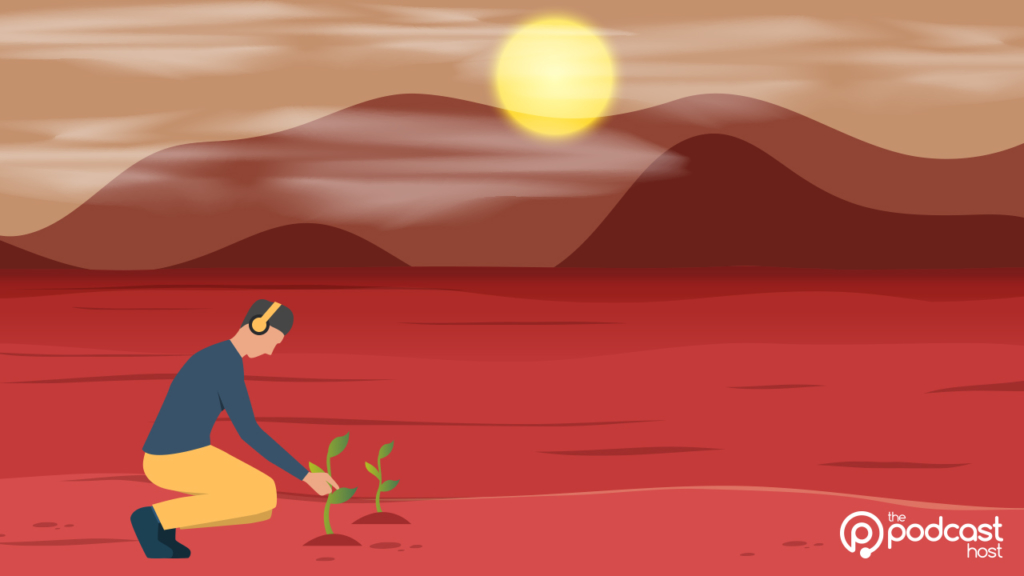
Podcasting is like planting seeds. You don’t know how they will grow. You might not see growth for a long time. The work that you put in, the routine you follow, and ideas that come out of the process are an end in themselves. You’re building skills. You’re making the world a better place (I hope). Your work provides information, entertainment, and inspiration for other people. And, it’s entirely possible that someone in your audience could be a mega-influencer who recommends your podcast to their thousands of followers. Or, someone could send you a zillion bucks saying, “please keep making more of my favorite podcast, don’t change anything.” Things can happen in the world that makes your podcast more relevant or necessary than they were last week.
Onward and Upward
When your podcast is simple to make, then there’s more balance between your effort and your podcast’s impact. Then, you can enjoy your podcast and your relationship with your audience. We can’t guarantee how your seedlings will grow, but we can make it easier for you to plant and nurture them.
- Join us in The PodCraft community
- Learn in Podcraft Academy
- Conquer the world with Podcast Growth: How to Grow Your Podcast Audience
- Dream and scheme with The Podcast Host Planner Journal: Organise, Execute, Grow
One Final Thought
One person said that podcasting is “difficult to sustain as a 1-person, 2-cat operation.” Clearly, they need to get a third cat.
Thank you, to the 266 people who shared their time and attention with us. We’re grateful for your candid responses and look forward to using this data to help you make better podcasts.
